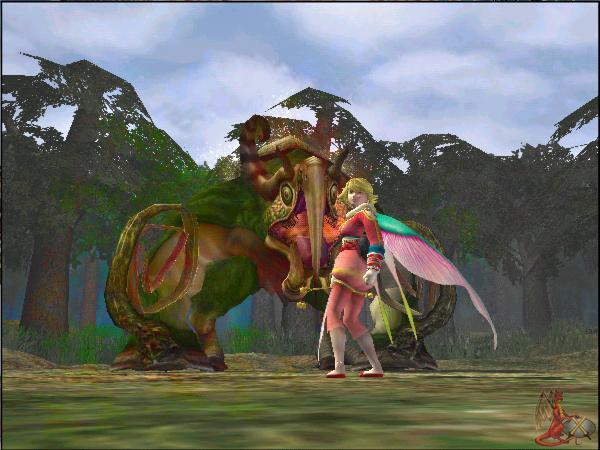|
|

|
BATTLE SYSTEM
|

|
INTERACTION
|

|
ORIGINALITY
|

|
STORY
|

|
MUSIC & SOUND
|

|
VISUALS
|

|
CHALLENGE
|
Easy |
COMPLETION TIME
|
40 to 60 hours
|
|
OVERALL
3.5/5
|
Rating definitions
|
|
|
Wanted: One hero to stop evil god of destruction. Requirements: Must be able to count to nine. Must have spirit guardian whose name is unutterable. Must be ruthless in pursuit of goal. One-winged freaks need not apply.
Baten Kaitos: Eternal Wings and the Lost Ocean is a an attempt to breath fresh air into an otherwise stale Gamecube RPG market. While the air may not be as originally fresh as hoped for, Baten Kaitos does render an enjoyable playthrough - though not without its share of bumps along the way.
The story for this tale is truly something to behold -- not for its uniqueness or surprise factor. Most RPG veterans have probably seen all of the elements before: floating islands, a disinterested hero with genuinely good heroine, and a band of misfits representing each clichéd region. There's a few shopkeepers who could be Ah My Goddess's Belldandy doppelgangers, and Gibari channels Wakka of Final Fantasy X with an almost horrifying exactness. The evil empire rears its ugly head - complete with an almost laughable Star Wars moment.
The main fallacy of Baten Katios's story is simply that it tries too hard at being original while pulling standard RPG elements from a wide variety of sources. The result is not so much terrible as it is saddening; the plotline held a good deal of potential but simply did not achieve greatness. A fair number of twists and turns adorn the plot's path, but most only lead to plotholes. Stilted and trite dialog do nothing but exacerbate the problem.
 What do you mean "Me
and What Army".... guys? Guys?
What do you mean "Me
and What Army".... guys? Guys? |
|
Fortunately, the battle system is unique, innovative, and deep. Eschewing the common connotation of collectible card games being for children, Baten Kaitos presents a thoroughly dynamic and complex battleplan that makes no individual battle routine.
Pervasive throughout the world of Baten Kaitos are Magnus. These cards play a number of roles during the game, but their major usage is in battles. Cards come in four major types: offensive, defensive, useable items, and combinable items; the Magnus simply represent individual items. Instead of wielding a real saber or shield of doom, its essence is captured in a Magnus and thus can be played during battle. As a side note, this also neatly sidesteps the issue of realistic inventory.
Each character has a primary deck which contains all of the cards that can be played during battle. Outside of battle, this deck may be rearranged at will; no constraints hold back the player in terms of customization save for character-specific items. If so inclined, a deck comprised of nothing but avocados could be played, though this would not generally be a wise idea. Much of the fun will come from finding the correct balance of item types within a deck and then across the three playable characters.
To further complicate matters, Magnus can also be charged in one of six elements. Elemental damage can only be blocked by the opposing element, and some enemies are naturally weak/strong to certain elements. On the downside, playing opposing elements in one turn - defensive or offensive - will result in the cancellation of elemental damage save for the balance of points.
But the real key to victory is achieving bonus multipliers. Each Magnus has at least one spirit number, ranging from one to nine, with nine being reserved for high-end Magnus. Playing two or more of the same spirit number yields a small percentage bonus, but forming a straight can yield over triple damage. The caveat is that if a single card is out of place, then the entire sequence is null. Characters start out with just a few cards in their hand and a small limit of playable cards, but classing up increases both the cards-in-hand and the combo limit while decreasing the initial amount of time to choose. Beginners have unlimited time to choose their first card, but the most advanced must formulate battle strategy within five seconds.
 Five seconds later, the
sky begins to fall.
Five seconds later, the
sky begins to fall. |
|
Magnus also change over time; this is especially true of food items. Meat and fruit can rot - or occasionally ferment. While in battle, items can also be combined if played in a correct sequence to form a new item. With over a thousand individual cards, Baten Kaitos provides a fluidly deep selection; the random nature of the drawing ultimately means that each battle will be completely unique.
Visually, Baten Kaitos does not disappoint. Bright and vibrant graphics are loving detailed and provide a stunning backdrop for the story. While the only FMV is the introduction sequence, scenes are usually well done, if somewhat ponderous. Some of the animation seems forced, and the player is forced to wade through all of it during story sequences.
Aurally, the game presents a very mixed bag. On the one hand, the soundtrack has an impressive range of enjoyable tracks that compliment the locales and mood of the story. On the other hand, the voice acting is atrociously amateurish and pointedly ponderous. Players would be well advised to utilize the "voice acting off" option. To add insult to injury, the characters interact with the player by simply pausing their voice speech when they need to speak the player's name. While some may argue in favor of the customization side, this sudden pause is a distraction from the immersive experience whenever it creeps up.
Baten Kaitos tips the scales at around forty to sixty hours with plenty of sidequests - mostly of the fetch variety - to keep players entertained. Replayability is simply going to depend on a player's first experience; the length and complexity of Baten Kaitos is simply too much to lark through.
Overall, Baten Kaitos comes recommended, especially for those seeking a deep and innovative battle system.
Review Archives
|









